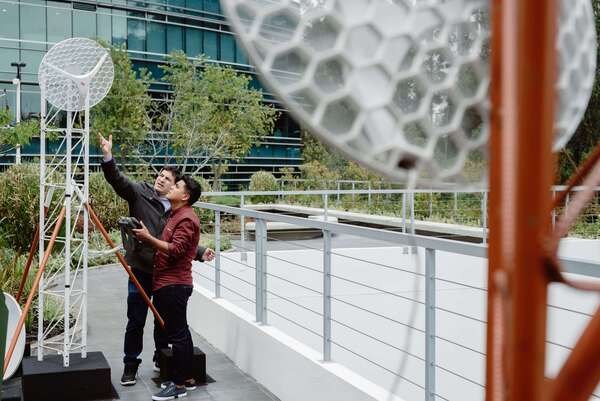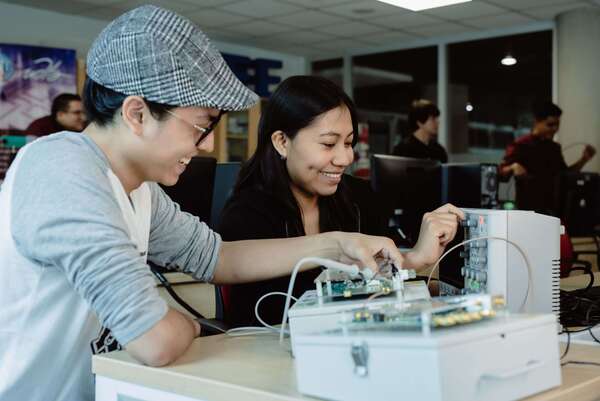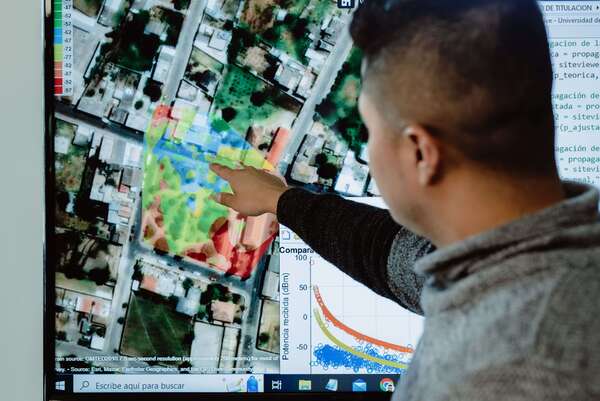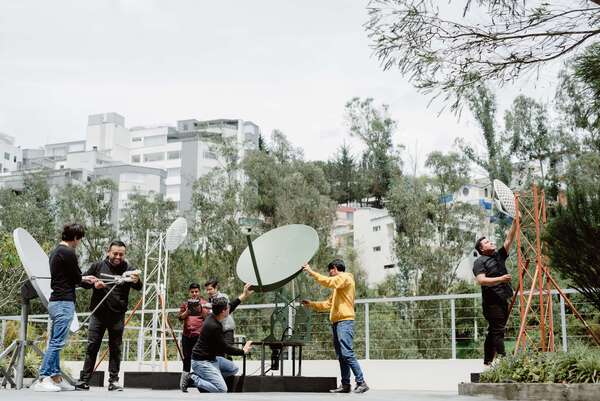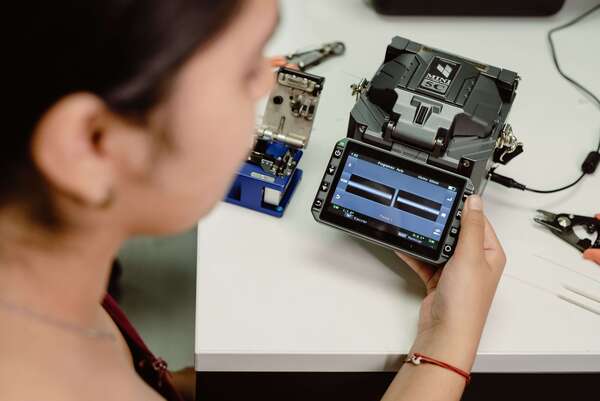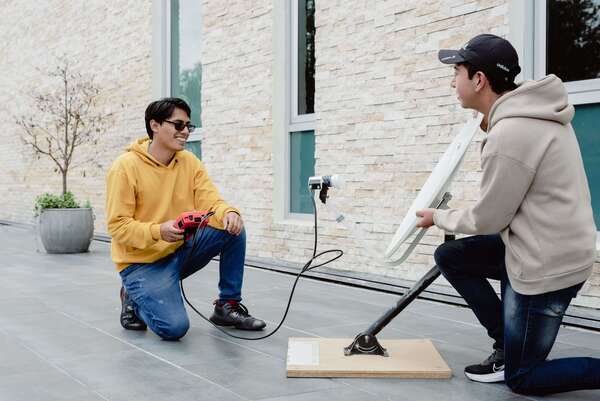Title : Bachelor in Telecommunications Engineering.
Duration: 9 semesters.
Modality: On site.
** The curriculum may be subject to changes.
As a Bachelor in Telecommunications Engineer from UDLA, you will be a professional who employs criteria of excellence, ethics, and social commitment, along with innovative concepts, to meet the technological and connectivity needs of our society through the design, implementation, operation, and management of telecommunications systems.
- In this career, you will have the opportunity to obtain international certifications through our academies and educational partnerships. The University of Americas actively participates in the work of the ITU (International Telecommunication Union) in the category of "Academic Institution, University, and Associated Research Institute." With the ITU Academy, you can take online technical and administrative courses with certification in the field of telecommunications anywhere in the world and in different languages through their centers of excellence. Additionally, you can share your knowledge, which will enable you to participate in specialized training and seminars.
- You will have access to Cisco certifications as part of the curriculum, focusing on developing your technical skills in networks and data communication.
- We have a team of certified faculty members in different areas of network and telecommunications technologies, with pedagogical and business experience in both the public and private sectors, ensuring quality teaching and a conducive learning environment.
- Starting from the fifth semester, you will have access to pre-professional internships, technical visits, and community engagement with significant institutions related to telecommunications and companies affiliated with the university.
- You will have specialized laboratories with state-of-the-art technology to obtain certifications, and you will engage in practical activities in all subjects from the first semester. We have laboratories for computing, electronics, networks, and telecommunications equipped with measurement tools, experimentation equipment, simulators, and data analysis capabilities. Additionally, with the support of an Experimental Data Center and the Technological Innovation Unit, you can develop projects to consolidate the knowledge acquired in theory. You can also become part of the largest global organization of engineers dedicated to standardization and development in technical areas through the IEEE (Institute of Electrical and Electronics Engineers) Student Branch at the university.
- Thanks to the ITU, you can access a database of youth employment resources and entrepreneurial initiatives. As a result, you have chosen a career with great global potential that responds to the needs of new telecommunications technologies. You will receive professional and academic training that will expand your horizons towards national and international postgraduate, technical, and management programs. In the future, you can envision yourself in positions such as technical manager, consultant, and technical advisor in the telecommunications field, as well as public positions such as director of information, radio communications, spectrum control, terrestrial digital television, among others.
Upon graduating as a Telecommunications Engineer, you will possess extensive knowledge in the following areas: physics, mathematics, and statistics for engineering; use and design of electronic devices; programming and algorithm development in software for the design, implementation, optimization, and operation of telecommunications networks.
You will understand the national and international regulatory framework governing the telecommunications sector.
You will have the ability to develop algorithms based on artificial intelligence and applications for electronic devices used in telecommunications networks, whether they are mobile devices (cell phones, tablets, etc.) or software-managed radio devices.
You will have the skill to conduct formative research in the telecommunications sector, thanks to interaction with researchers holding a Doctorate (PhD) during the educational process.
You will have the competence to easily comprehend various emerging areas associated with the technology sector, including network security, telematics, big data, machine learning, among others.
You will possess the knowledge to lead and manage project development in technology companies.
You will have the skills to undertake and innovate using emerging tools and technologies.
Graduates of the Telecommunications Engineering program can be part of various companies, whether they are related to the technology sector or not since every company or public/private entity requires a telecommunications network for its proper functioning. This guarantees a high rate of employability.
You will be part of a career with a high rate of employability of its students, who from the first semesters are placed around telecommunications technologies of important companies such as:
- Operators of Fixed, Mobile and Internet Telephony.
- Banking Institutions
- Technology Companies
- Multinational Companies
- Public Sector
Finally, the knowledge acquired will allow you to continue with fourth level studies both nationally and internationally.
The Telecommunications Engineer from the University of Americas is a competent, entrepreneurial, and globally minded professional capable of developing telecommunications system projects through comprehensive knowledge of information processing, transmission, and reception via guided and wireless means, to meet the communication needs of users and organizations, based on excellence, ethics, and social commitment.
The graduate identifies, analyzes, designs, develops, implements, and evaluates solutions to complex engineering problems by applying principles of Telecommunications Engineering, science, and mathematics. They effectively communicate in professional contexts and seek continuous updating by utilizing appropriate learning strategies. They function effectively as a member or leader of a telecommunications development team. They recognize their professional and ethical responsibilities, analyze, and interpret data, make informed judgments, incorporate new computer technologies, employ certified practices, and apply their technical and holistic training to achieve organizational objectives in diverse scenarios.
It is expected that the Telecommunications Engineer will continue their academic training, adhere to the current legal framework, responsibly apply their comprehensive knowledge, and actively contribute to the country's development.
The educational objectives of the Telecommunications Engineering program are as follows:
- Acquire theoretical and practical knowledge to develop and implement innovative, efficient, and effective technological projects in the transmission of analog and digital data, based on the fields of Telecommunications Engineering.
- Possess vision, initiative, passion, leadership, and creativity to plan and execute the design, research or implementation of telecommunications systems that contribute to the fulfillment of the sustainable development objectives established by the United Nations to ensure progress and improve the welfare of society.
- Strengthen integral skills, adapting to technological changes throughout life through training and permanent updating.
- To add value to organizations by exercising their profession with values and ethical principles.
A graduate of the Industrial Engineering program will be able to:
- Identifies, formulates, and solves complex engineering problems through the application of engineering principles, science and mathematics.
- Applies engineering design to produce solutions that meet specific needs considering the domains of public health, safety, and welfare, as well as global, cultural, social, environmental, and economic factors.
- Communicates effectively to a wide range of discipline-specific audiences.
- Recognizes ethical and professional responsibilities in engineering situations and makes informed judgments, which must consider the impact of engineering solutions in global, economic, environmental, and social contexts.
- Works effectively in a team whose members, together, exercise leadership, create a collaborative and inclusive environment, set goals, plan tasks, and accomplish objectives.
- Develops and conducts appropriate experiments, analyzes, and interprets data, and uses engineering judgment to draw conclusions.
- Acquires and applies new knowledge as needed, using appropriate learning strategies.
The Career Advisory Committee is a consultative body that deals with matters related to the fulfillment of learning objectives, graduate profiles, and other academic aspects relevant to the profession.
Functions:
- Review the graduate profile, educational objectives, learning outcomes, and curriculum of the program.
- Propose changes or suggestions for improvement in the graduate profile, educational objectives, learning outcomes, and curriculum of the program.
- Review the results of the Annual Operational Plan of the program.
- Review the self-assessment reports of the program and improvement plans.
Conformación:
Denominación | Nombre |
Decano de la Facultad o su delegado | Diego Buenaño |
Máxima autoridad de la carrera o su delegado | Julio Freire |
Docente responsable de seguimiento a graduados | Carlos Carrión |
Representantes de los empleadores y/o representantes de gremios o asociaciones profesionales | Gustavo Barreiros (Presidente) |
Ana Veneroso | |
Oswaldo Rivera | |
Román Lara | |
Graduados | Ismael Gutierrez |
Katherine Plasencia | |
Steven Brazales | |
Walter Rosero |
Bachelor
| Academic Year | 2018 | 2019 | 2020 | 2021 | 2022 | 2023 |
| Number of Students | 0 | 0 | 217 | 152 | 94 | 74 |
Estudiantes Graduados
| Academic Year | 2018 | 2019 | 2020 | 2021 | 2022 | 2023 |
| Number of Students | 38 | 36 | 46 | 39 | 57 | 28 |
If you are enrolled in another university, you can have your courses recognized through our simulator and study at UDLA.
Apply here
